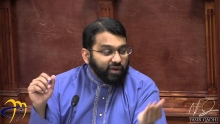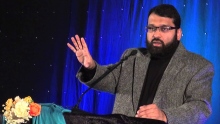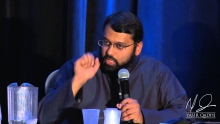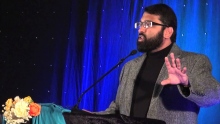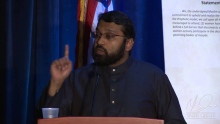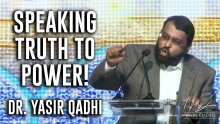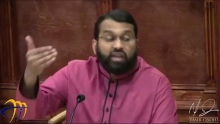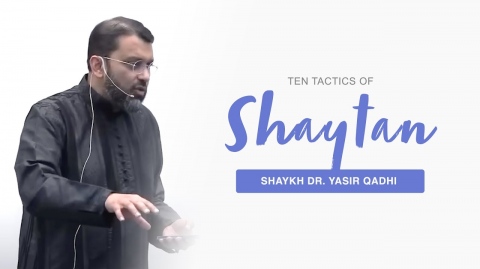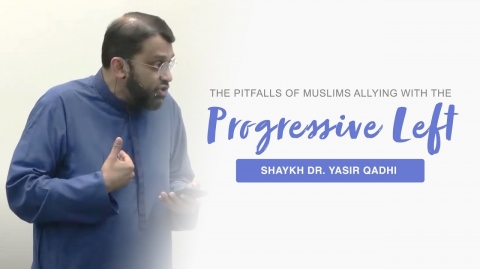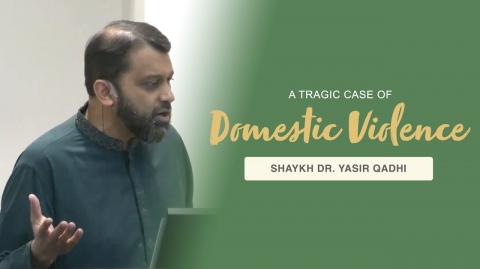Abu Bakr al-Siddiq: Part 7 - Compilation & Preservation of the Qur'an ~ Dr. Yasir Qadhi
10 years ago
01:29:29
13,055 views
View all previous videos in this series here: https://www.youtube.com/playlist?list=PLYZxc42QNctWVL4AfVftcF7TL3b0_Wrc0
During the Khilafah of Abu Bakr (may Allah be pleased with him) seventy of the Sahabah that had memorized the Qur'an were martyred in the battle of Yamama fighting against the false prophet Musaylama al-Khadab.
The Qur'an at that time was not complied in one single book. Upon realising that if more companions that had memorised the Qur'an became martyrs the Qur'an may be lost forever the great companion Umar b. al-Khattab (may Allah be pleased with him) insisted to Abu Bakr to compile the Qur'an in one book.
And so began the historic and momentous task of compiling the Speech of Allah!
Other topics:
Surprise attack on Medina:
When Abu Bakr (r) said he would attack those who had left Islam, a small group from the tribes of Asad and Gatafan attempted a surprise attack on Medina. However, Abu Bakr (r) had stationed guards on the outskirts of the city and also had a force sleeping inside the masjid on-call. When this group attacked, the Muslims lead by Abu Bakr (r) himself went out to fight them.
Abu Bakr participated in 3 such expeditions and also launched approximately 12 armies each with multiple goals. They would eventually fight the Romans and Persians. Within 1.5 years, 40 skirmishes by 12 armies took place.
Ali (r) told Abu Bakr (r) "sheathe your sword back, for if you die, Islam will have no political leader after you." Shows mutual respect between the two. Abu Bakr (r) realized Ali's point and stayed back from further participation.
Results and lessons from the wars of Ridda:
1) Trained many Sahaba far bigger wars to come. Khalid Ibn Waleed's status was boosted during these wars. Ikrima ibn Abi Jahl also made up for his past by demonstrating himself during these battles.
2) Cemented the political stability of the Ummah, by removing various false prophets.
3) Theological unity - by removing variations in theology (ie, lack of Zakah)
4) Having political authority sometimes is necessary to preserve the truth. (Especially in early stages of Islam)
5) Sahaba agreed that anyone believing in false prophet is not a Muslim
Preservation of the Qur'an:
One of the main repercussions of the battles of Ridda was the preservation of the Qur'an. When the Prophet (s) died, the Quran was not gathered as a single book. It was, however, written down by various Sahaba on various materials.
Why wasn't it gathered yet?
Because, the Prophet (s) was alive, it was being written by various Sahaba (individually) and revelation was still coming down with verses being inserted in non-chronological manner (including abrogation of some ayahs).
However, in the battles of Ridda, 70 huffadh (memorizers) were killed. Note, only 4 individuals had memorized the Qur'an from top to bottom during lifetime of the Prophet (s). Umar (r) suggested to Abu Bakr (r) that the Qur'an be collected before more sahaba die. Abu Bakr (r) said "How can I do something that the Prophet (s) himself did not do.." However, Umar continued to suggest until
Abu Bakr (r) agreed.
Zayd Ibn Thabit was given responsibility of compiling the Qur'an, known for being the primary scribe for the Prophet (s) (Quttab al Wahi). He was one of the 4 full memorizers (Ubay Ibn Qa'b, Mu'ad Ibn Jabil and Abu Zayd being the other 3). Zayd Ibn Thabit was the youngest, with the sharpest memory. He was barely 11 when the Prophet (s) arrived in Medina and had already memorized 17 surahs. Zayd recited to the Prophet (s) and he (s) was pleased with what he had seen. Zayd was also present in the final recitation of the Prophet (s) to Jibril before his (s) death.
Ubay Ibn Qa'b, Ibn Mas'ud, Mua'd Ibn Jabl and Zayd Ibn Thabit had specialized in the recitation of the Qur'an. Zayd was reluctant to take on the responsibility of compiling the Qur'an, showing his modesty.
Within 1 year of death of the Prophet (s), while no major Sahaba had died yet, the entire qur'an was compiled by Zayd Ibn Thabit on loose parchment (mushaf). He was a memorizer himself, but did not rely solely on himself. There was no controversy over this compilation.
Where does the arrangement of surahs come from?
Answer: It is done by the sahaba.
What are the differences between Abu Bakr (r)'s compilation and Uthman (r)'s compilation (some 13 years later)?
1) Abu Bakr's (r) reason was to compile it while Uthman's (r) was to standardize it (language, spelling of words, etc)
2) Abu Bakr (r) made 1 copy, where Uthman had 6 or 7 copies made
3) Abu Bakr (r) had no desire to eliminate other copies, while Uthman desired to burn (as a token of respect) all other copies except one (in order to standardize)
Abu Bakr (r)'s compilation was given to Hafsa (r), the widow of the Prophet (s), who held it until her death. This compilation of Abu Bakr (r) was then eliminated by Marwan (Medina governor) so that Uthman's (r) copy would be the standard.
Recorded 6th May 2015
During the Khilafah of Abu Bakr (may Allah be pleased with him) seventy of the Sahabah that had memorized the Qur'an were martyred in the battle of Yamama fighting against the false prophet Musaylama al-Khadab.
The Qur'an at that time was not complied in one single book. Upon realising that if more companions that had memorised the Qur'an became martyrs the Qur'an may be lost forever the great companion Umar b. al-Khattab (may Allah be pleased with him) insisted to Abu Bakr to compile the Qur'an in one book.
And so began the historic and momentous task of compiling the Speech of Allah!
Other topics:
Surprise attack on Medina:
When Abu Bakr (r) said he would attack those who had left Islam, a small group from the tribes of Asad and Gatafan attempted a surprise attack on Medina. However, Abu Bakr (r) had stationed guards on the outskirts of the city and also had a force sleeping inside the masjid on-call. When this group attacked, the Muslims lead by Abu Bakr (r) himself went out to fight them.
Abu Bakr participated in 3 such expeditions and also launched approximately 12 armies each with multiple goals. They would eventually fight the Romans and Persians. Within 1.5 years, 40 skirmishes by 12 armies took place.
Ali (r) told Abu Bakr (r) "sheathe your sword back, for if you die, Islam will have no political leader after you." Shows mutual respect between the two. Abu Bakr (r) realized Ali's point and stayed back from further participation.
Results and lessons from the wars of Ridda:
1) Trained many Sahaba far bigger wars to come. Khalid Ibn Waleed's status was boosted during these wars. Ikrima ibn Abi Jahl also made up for his past by demonstrating himself during these battles.
2) Cemented the political stability of the Ummah, by removing various false prophets.
3) Theological unity - by removing variations in theology (ie, lack of Zakah)
4) Having political authority sometimes is necessary to preserve the truth. (Especially in early stages of Islam)
5) Sahaba agreed that anyone believing in false prophet is not a Muslim
Preservation of the Qur'an:
One of the main repercussions of the battles of Ridda was the preservation of the Qur'an. When the Prophet (s) died, the Quran was not gathered as a single book. It was, however, written down by various Sahaba on various materials.
Why wasn't it gathered yet?
Because, the Prophet (s) was alive, it was being written by various Sahaba (individually) and revelation was still coming down with verses being inserted in non-chronological manner (including abrogation of some ayahs).
However, in the battles of Ridda, 70 huffadh (memorizers) were killed. Note, only 4 individuals had memorized the Qur'an from top to bottom during lifetime of the Prophet (s). Umar (r) suggested to Abu Bakr (r) that the Qur'an be collected before more sahaba die. Abu Bakr (r) said "How can I do something that the Prophet (s) himself did not do.." However, Umar continued to suggest until
Abu Bakr (r) agreed.
Zayd Ibn Thabit was given responsibility of compiling the Qur'an, known for being the primary scribe for the Prophet (s) (Quttab al Wahi). He was one of the 4 full memorizers (Ubay Ibn Qa'b, Mu'ad Ibn Jabil and Abu Zayd being the other 3). Zayd Ibn Thabit was the youngest, with the sharpest memory. He was barely 11 when the Prophet (s) arrived in Medina and had already memorized 17 surahs. Zayd recited to the Prophet (s) and he (s) was pleased with what he had seen. Zayd was also present in the final recitation of the Prophet (s) to Jibril before his (s) death.
Ubay Ibn Qa'b, Ibn Mas'ud, Mua'd Ibn Jabl and Zayd Ibn Thabit had specialized in the recitation of the Qur'an. Zayd was reluctant to take on the responsibility of compiling the Qur'an, showing his modesty.
Within 1 year of death of the Prophet (s), while no major Sahaba had died yet, the entire qur'an was compiled by Zayd Ibn Thabit on loose parchment (mushaf). He was a memorizer himself, but did not rely solely on himself. There was no controversy over this compilation.
Where does the arrangement of surahs come from?
Answer: It is done by the sahaba.
What are the differences between Abu Bakr (r)'s compilation and Uthman (r)'s compilation (some 13 years later)?
1) Abu Bakr's (r) reason was to compile it while Uthman's (r) was to standardize it (language, spelling of words, etc)
2) Abu Bakr (r) made 1 copy, where Uthman had 6 or 7 copies made
3) Abu Bakr (r) had no desire to eliminate other copies, while Uthman desired to burn (as a token of respect) all other copies except one (in order to standardize)
Abu Bakr (r)'s compilation was given to Hafsa (r), the widow of the Prophet (s), who held it until her death. This compilation of Abu Bakr (r) was then eliminated by Marwan (Medina governor) so that Uthman's (r) copy would be the standard.
Recorded 6th May 2015


 English
English Български
Български No filter
No filter
